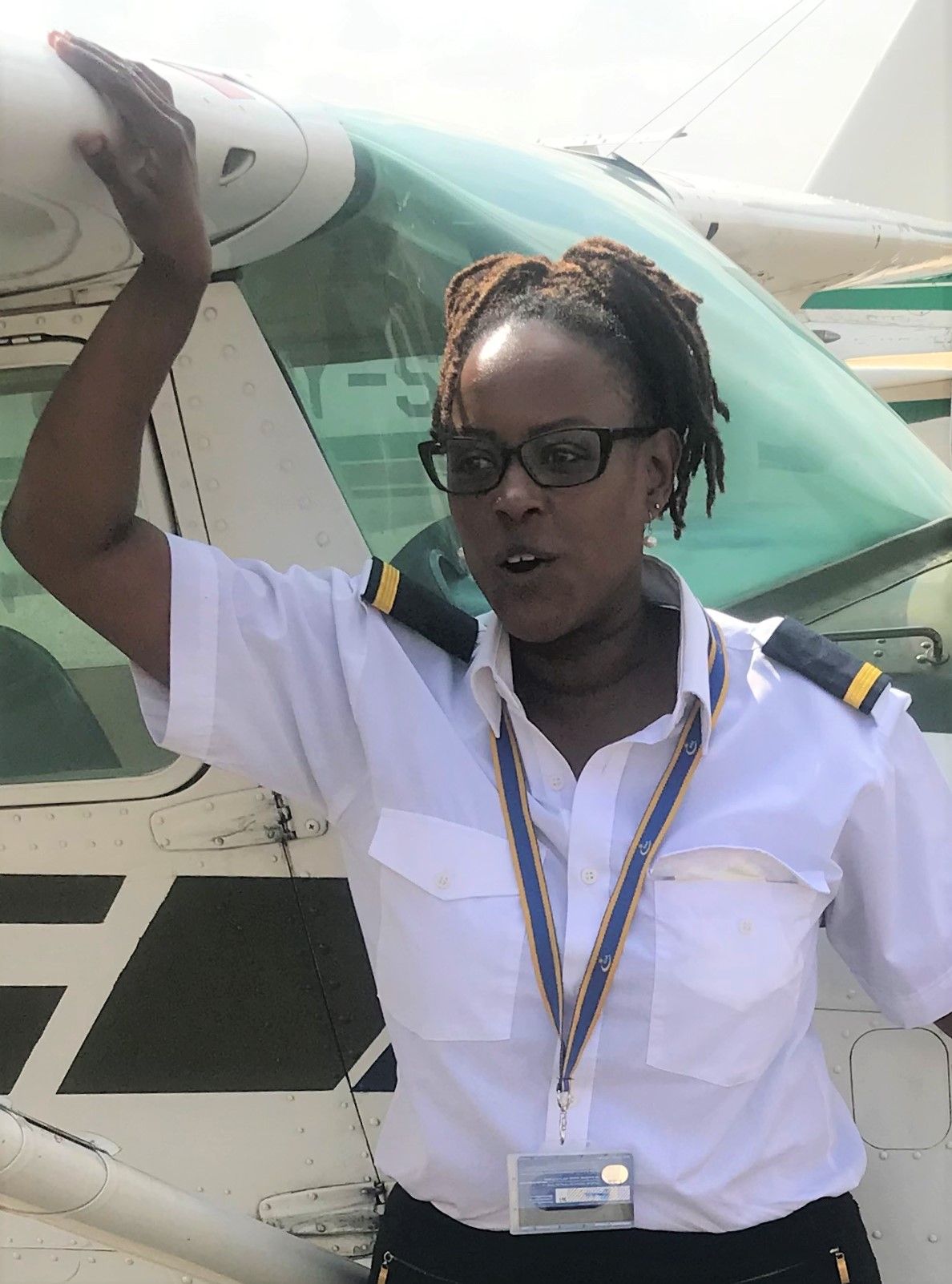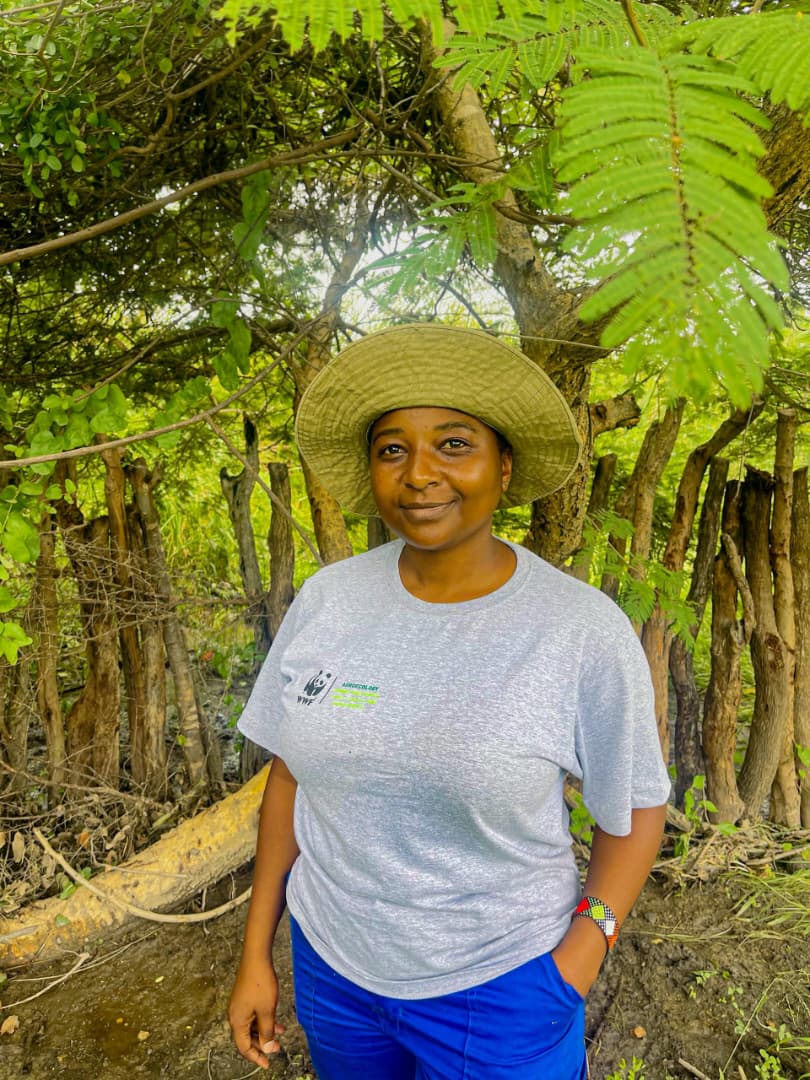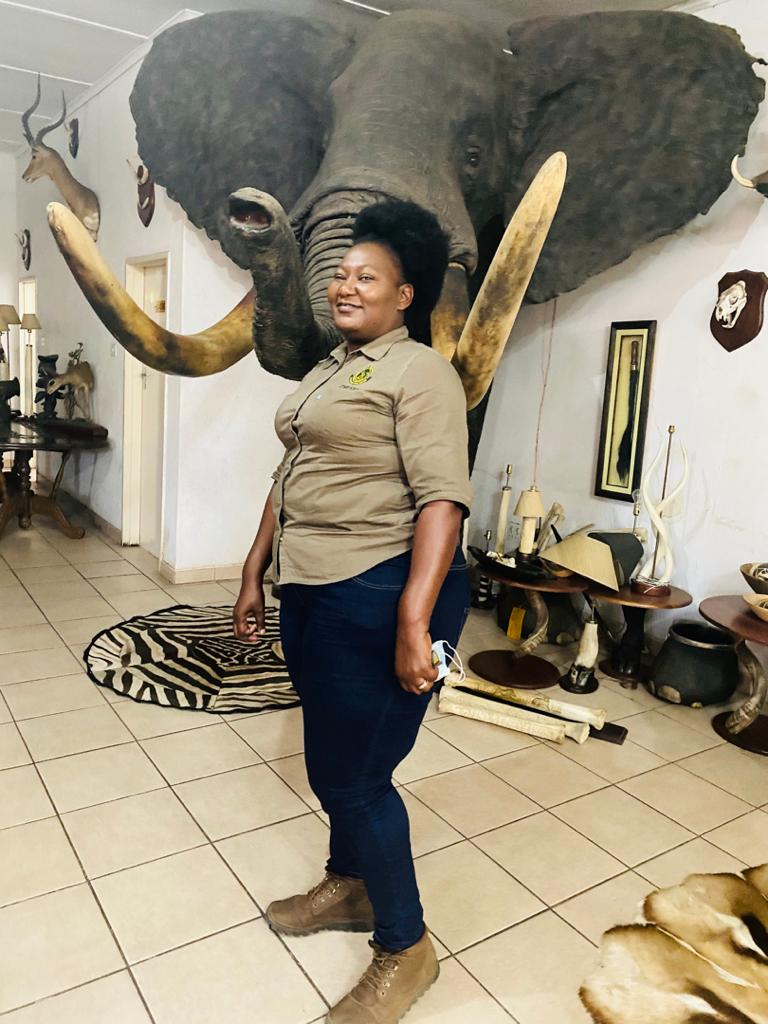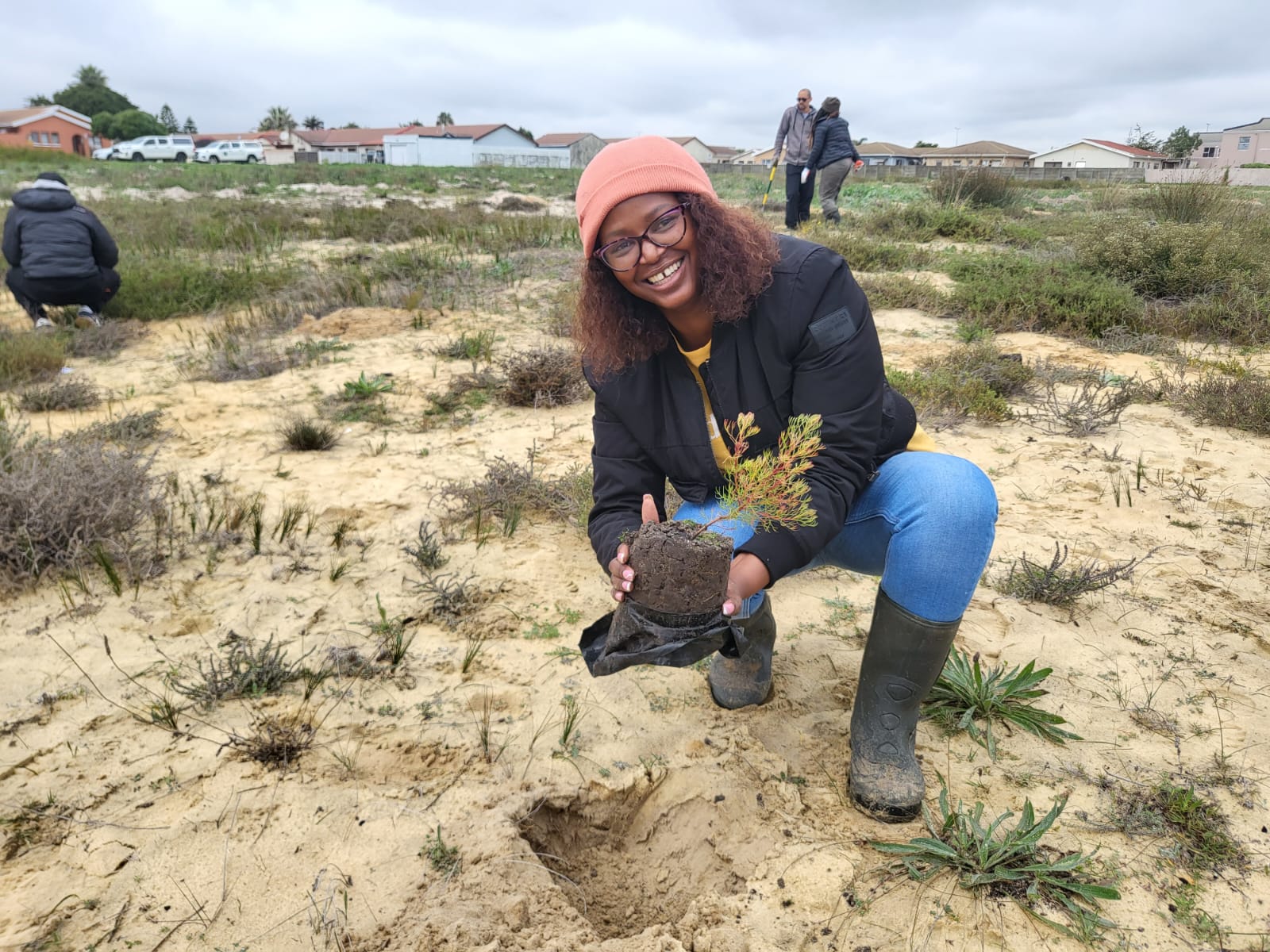You're never too old, never too late, and never too broken to pursue your dreams, to start again and to do whatever it is that you want to do.

Captain Nyambura Gathuru
Reinventing yourself isn’t about becoming someone else; it’s about realigning your life with what you want and taking the necessary actions to become who you know you can be. Nyambura Gathuru should know. In 2019, she made a clean break from her corporate banking career to pursue her childhood dream of flying planes.
The 42-year-old who describes herself as a multifaceted individual shares, with Damaris Agweyu, her journey towards self-reinvention.
Nyambura, what gets you excited?
Travel, swimming pools, pianos and airports.
Airports? Really?
Maybe not airports so much as aeroplanes. They fascinate me. When I was a teen, my older brother would take me to the waving bay at JKIA to watch the planes every Saturday or Sunday; this was all before terrorism became a thing. Once that bay was closed off, I switched my location to the Uchumi supermarket at Wilson airport. I always dreamed of flying a plane.
And close to 3 decades later, your dream has become a reality.
Yes. It’s been a long time coming. My career had been in Corporate Banking for a decent amount of time before then.
How did you finally crossover?
I was working as an account relationship manager when I met Captain Gilbert Kibe, the current Kenya Civil Aviation Authority Director-General. He was one of my clients at the time. During one of our conversations, I told him about my fascination with flying. He told me he would be happy to introduce me to aviation. “Free up your Saturday mornings, and if there is an available aircraft, I will invite you to take a familiarization flight”, he said.
I freed up my Saturdays and waited…and waited.
One morning he called and asked how quickly I could get to Wilson airport. I needed an hour tops. He told me to put on a white shirt, black pants and flat, comfortable shoes; and make my way there.
He introduced me to a Cessna- 172, a small four-seater aircraft. At some point during our flight, he gave me the controls and instructed me to keep the aircraft flying towards some turbines up the Ngong hills. I lived in Ngong at the time, and as we approached the Ngong town vicinity, he asked me to locate my house, which I did. At one point, I came close to throwing up; thankfully, I didn’t. Because at the end of the flight, Captain Kibe told me, “You didn’t throw up? You may have what it takes to fly!”
It would take another eight years before I took the leap.
Why so long?
I didn’t feel ready. I was ensconced with my current job. Or maybe I just needed a push. I had been working as a Corporate Banker for several years. While it was very rewarding and financially stable, the long hours that I kept, coupled with chronic stress had started to diminish my creativity and passion. I was hitting 40 and feeling somewhat despondent. Something had to give. I knew that I had to start thinking differently. It was time to re-invest in myself and pursue a new adventure.
By now, all I wanted to do was fly, and my ultimate goal was to become a commercial pilot, but that would be a costly affair and dare I say, a huge risk; I needed a plan.
I put up a standing order that pushed a significant amount of my income to a savings account. I sold my BMW and replaced it with a Vitz. I would go for my piloting classes during my spare time on weekends and days off. The weeks were long, but my excitement was back.
And then, I got the final push that I needed. I heard that the organization that I was working for at the time was right sizing and would offer voluntary early retirement packages to those who wanted it. I applied for it and navigated the politics of leaving the company with my bosses; I got a positive response. The early retirement package helped me pay off my mortgage and left me with some extra cash. It was a godsend.
And now you have your private pilot license?
Yes. The minimum number of hours for graduating with the private pilot license is 40 hours of flying; I completed 63 hours. And now I am working towards my commercial pilot license. It requires a minimum of 200 hours of flying and is contingent on my financial resources. The time frame to complete it is one and a half years from the date of successfully passing the theory exams and I am hoping to be done by Quarter 3 of 2021.
Being a pilot is continuous learning, and it is intense. It’s definitely not for the faint-hearted! By the time you are flying KQ to Paris, for instance, you need to have a multi-engine and multi-instrument rating, meaning I need to be able to handle a multi-engine aircraft at night, in Instrument Meteorological Conditions (poor visibility conditions) – and those are just the minimum entry requirements. The airline you work for has to train you on their type of aircraft. We’re talking thousands of flying hours. It’s an ongoing process and is quite a journey.
 Captain Nyambura Gathuru with her flight instructor, Captain Kariuki Muigai.
Captain Nyambura Gathuru with her flight instructor, Captain Kariuki Muigai.
Did you know all this when you were getting into it?
Hehe, I figured it out later, when I was sitting for my exams. It requires a lot of dedication. If you’re not committed to continuous learning, don’t bother with piloting. I am in class with really young people that I look to as my reverse mentors, I have learned a lot from them… sometimes I wonder if they fully appreciate what they are in for. I certainly wasn’t this dedicated when I was 19!
Would you call yourself a risk-taker?
I like the thrill that comes with trying new things, but I am also a bit of a worrywart in a sense. Financial security is important to me. But as I have gotten older, I have learnt that time doesn’t wait for anyone. I realized I was at a place where I could put some cash into my idea and just went for it.
Most of us opt to stay comfortable- not necessarily happy or driven, but comfortable.
So you tend to follow your gut?
I do. I have a pretty good sense of myself. If I have a potentially life-changing decision to make, I will talk to a few of my confidants, I’ll mull over their advice, and when my heart and brain are aligned, I will go for it. And then once I’m in, I give it 100 per cent.
I’ve also learned to have a lot of self-compassion, knowing when to stop expending resources on something that isn’t working. I learned that in my thirties.
Did you learn this the hard way?
I’ve done many personality tests that have always indicated that I need to be wary of this. Holding on is a strength when a project is viable, but it can become a great weakness and threat when it is no longer feasible.
Truth be told, if you listen to yourself, you’ll know when it’s time to stop; sometimes we don’t want to face reality. But what has worked for you in the past will not necessarily work in future. Sometimes it’s okay to give up or rather to let it go!
Giving up or letting go is often frowned upon; as if it’s a failure. Why are people so afraid of failing?
I think the definition of failure is a societal construct in itself. Most of us opt to stay comfortable- not necessarily happy or driven, but comfortable. This keeps us so average in ourselves, yet we can be much more – not necessarily in the context of what society says but for ourselves.
To give you an example, when I got married I didn’t think divorce was an option. But the relationship didn’t work. I found myself mentally and emotionally depleted. I had nothing more to put into it. So, I made a call for myself and left my marriage. Now according to society, this was a failure. But to me, it’s about knowing when the situation is no longer viable; it’s a deeply personal decision. No therapist, friend or parent can tell you when you’ve reached your end.
We are conditioned to think that life is linear: you’re born, you go to school, you get a job, get married by a certain age, have kids by a certain age and retire by a certain age; and if something breaks in that line, then you are a failure. We have to be careful about these notions because I don’t think any good has come out of a one-shot success. It’s the blips and setbacks in our lives that grow us.
Maybe we should stop calling it failure or redefine the term altogether.
Yeah. Maybe call it a ‘growth phase’ – because, in our current context, when young people encounter those blips, they may tend towards throwing in the towel and becoming directionless. Perhaps, they do not have enough models who will tell them the hard truths. We often only want to talk about our lives from a point of success and seldom want to go into the details of the rough times, yet we all go through that! The rough and tumbles are truly the defining points in our lives!
Can you share with me, a personal ‘failure’ story?
I would say going through a divorce in my early 30s… and all the trauma that comes and goes with it. I was diagnosed with depression towards the tail end of the relationship. Somehow my brain chemistry had changed; I was barely sleeping and I had a lot of anxiety. I was put on antidepressants and began intensive Cognitive Behavioral Therapy. During this time, I moved back into my parents’ home. It was a humbling experience, but one I would never trade for anything. My family stood by me and supported me through it all. Within a year and a half, my doctor had weaned me off the antidepressants and my life was shaping up in a new and different direction.
What did you learn from that experience?
We shouldn’t take things at face value. When I was going through all this, I found myself amassing stuff – stuff that I was sure would paint a better picture to the world than what my reality was. Maybe because I didn’t want to be judged or maybe because I felt I was being judged. But I realized that whatever mask I wore, it didn’t make the reality of what I was going through any easier, better or different. I think we need to be more honest about our lives and what makes us human.
How did you get through the dark times?
Other than therapy, I composed a lot of music. I am a self-taught pianist, and my best compositions come to me when I am experiencing extreme emotions – when I am sad or when I am excited. You can feel the mood of the music by the way it sounds.
Life, to me, is having a goal and trusting the process of how it unfolds.
Any regrets so far?
Everything I have gone through has given me a better sense of myself. I am now a middle-aged woman. At this point in life, it’s easy to feel stuck, to settle, to let the wind blow you where it will. But I have refused to conform to that notion. You’re never too old, never too late, and never too broken to pursue your dreams, to start again and to do whatever it is that you want to do.
I have an aunt who passed on some years ago, Aunt Peris. I truly admired her. She went back to school to finish her undergrad in her 50s. She was the oldest and probably the most brilliant student in her class. She went on to do her Masters degree and got back into employment, in a very senior kick-ass role! Every time I am in class and feeling old, I remember my aunt, her life never stagnated… she stayed hungry and she continued to stretch herself to greater heights. What an inspiration!
There’s a whole group of us that might be in a place where we are transitioning into a new place, and it’s easy to settle.
It’s always easier to settle.
Its inertia, the physics law: Your general state of motion is not forward moving. Your body wants to stay where it is. To just stay put! In order to get going, you need a force to push you.
Thinking about doing something is not enough; you have to act. It may take brute force in a sense, but the moment you start moving, you keep going, and the body wants to keep going- until you stop it with another force.
I remember my psychiatrist telling me that your thoughts about ‘impact” become more urgent as you get older. I feel that reality has hit home for me. If I get up every day and pursue that which I love, then my life will speak for itself – and maybe that’s all I need to do. I don’t have to be Mahatma Gandhi or Oprah.
In retrospect, what is the best decision you’ve ever made?
I can’t pinpoint one decision, but I can say that the best decisions have been the ones that I have felt very strongly about and that came from my gut. I equate the gut to a car’s headlights at night, just illuminating the next step as the road unfolds. Leaving my last place of employment to pursue my piloting career on a full-time basis, was a gut-led decision, and it was a great decision. There are many blessings that have unfolded for me by making just that decision.
What have you learned about life?
I don’t think life is about getting somewhere and saying you’ve made it; it’s a continuous journey. When I got my private pilot license, I was elated but that moment lasted like 15 seconds; and then it was back to learning. So life, to me, is having a goal and trusting the process of how it unfolds. Not getting to some kind of destination.
I believe in God, so I know He will hold everything together for me. It’s about taking action, having faith in an outcome you can’t yet see and having self-compassion when you hit bumps along the road because you know you can always redirect yourself.
We say this in flying: realign yourself with the course because you’re not flying through the still air. You will have the wind taking you to the right, or left, maybe even a headwind that is coming at you. You have to keep resetting course, add a bit more power if you need to. And if that headwind becomes a tailwind, it will push you forward and get you there faster. The point is you are not in control of your environment, but you are in control of your actions, and you have to be in motion.
I’ve also learned that it’s essential to listen to your gut. You can get sidetracked along the way and find yourself in a completely different direction. But there is always that drum that is beating in your soul, keep it alive. If you do, I think, I know, you will find your way back.
What advice would you give to anyone who may feel that they have lost their way and can no longer hear that drum?
Go back to your teenage years- who you were in high school is who you are now. We don’t fall far away from that. We can learn to be cautious; the environment can shape us in one way or other, or we may wear masks and hold our cards close to our chests, but we’re never far from who we were when we were young, free and restless. During those years, you discover the things you’re good at or can be good at. You discover things that fascinate you. So, take time to be with yourself, go back and find those things that got you excited- even if you never voiced them to anyone. And then, redirect your life towards that.
And if you can’t earn a living from what you find?
It doesn’t matter; it could be a pathway to something else.
When I get employed as an Airline Pilot, I’ll probably start off earning a lot less than what I earned when I left Corporate Banking. But I’m okay with that because my heart beats for the skies and I know it’s just a matter of time before the remuneration racks up! God-willing, I have 23 more years before I am required to retire, and who knows what will unfold during that time… 23 years is another lifetime, right? For now, I have a roof over my head and I have figured out how to manage my finances. I’m in a fulfilled place. I am happy to start with less.
My advice is, keep on reinventing yourself, keep your life exciting, and remain like children with a sense of awe and wonder- it keeps you young, it keeps you alive and it keeps you fresh!





